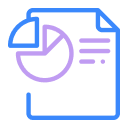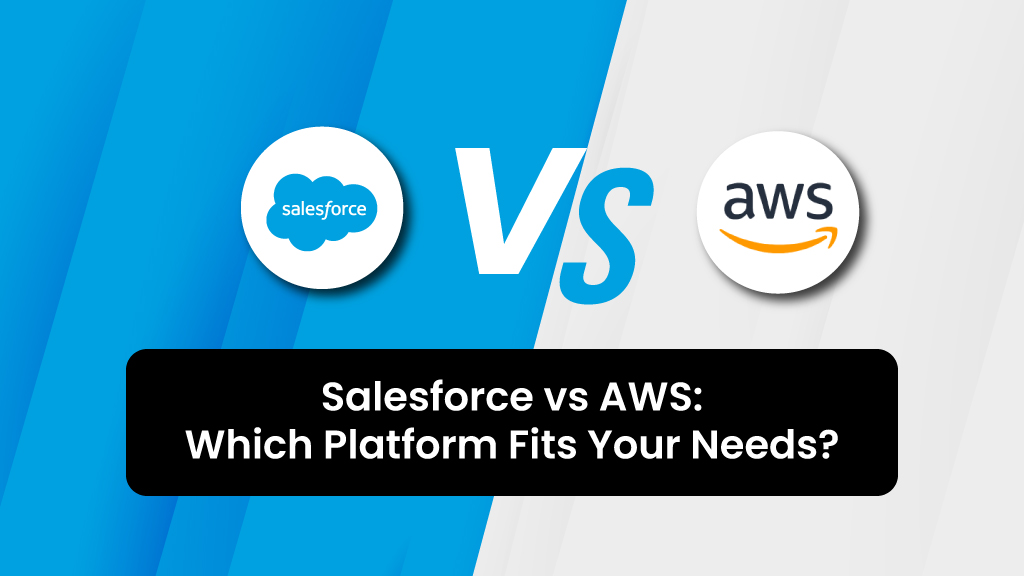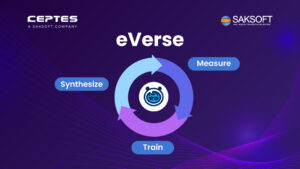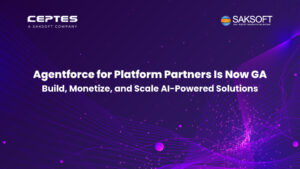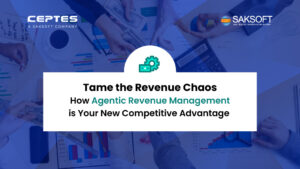Selecting the ideal platform for app development is crucial for businesses aiming to build scalable, efficient, and impactful applications. Salesforce and AWS are two leading options that offer unique advantages depending on your project’s needs. AWS provides developers with the freedom to create fully customized applications using a wide array of tools, while Salesforce focuses on delivering fast, low-code app development tailored to business workflows and customer data.
They serve different purposes and are suited to different types of projects. So, now, the question is, salesforce vs aws, which is better? How do you choose between Salesforce and AWS for app development?
Let’s dive into a comparison based on key factors like flexibility, scalability, target users, and use cases, in short, see who wins the battle: Salesforce vs AWS
Overview of AWS

Key Strengths of AWS for App Development:
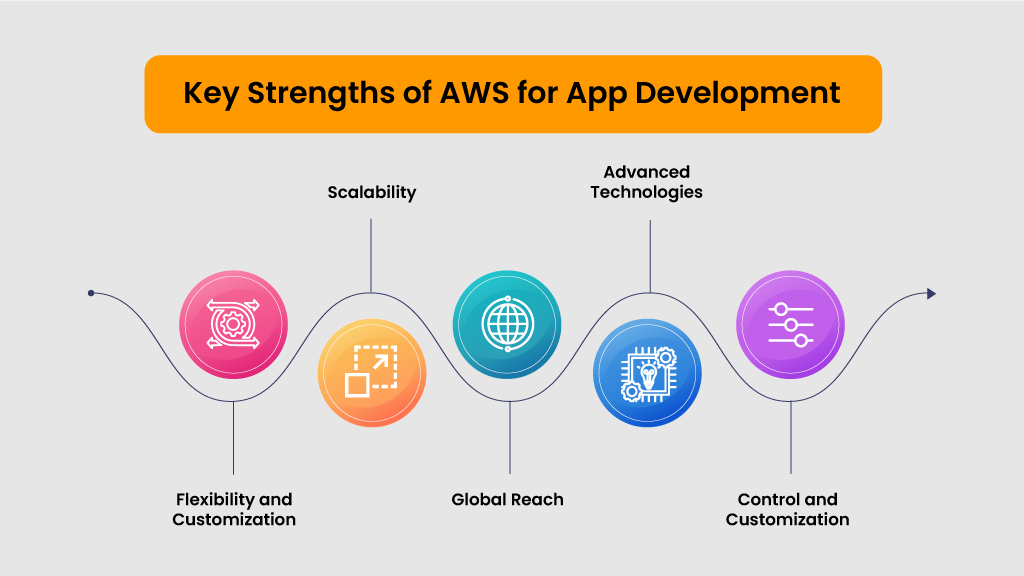
1. Flexibility and Customization:
AWS offers unmatched flexibility. Developers can build applications from the ground up using multiple programming languages, frameworks, and databases, such as MySQL, PostgreSQL, and MongoDB.
2. Scalability:
AWS is known for its ability to scale automatically as your app grows. Services like Elastic Beanstalk and EC2 make it easy to manage traffic spikes and expand capacity without worrying about infrastructure.
3. Global Reach:
AWS’s global data centers ensure low latency and quick response times, allowing developers to deploy apps closer to users around the world.
4. Advanced Technologies:
With AWS, you can leverage cutting-edge technologies like machine learning (Amazon SageMaker), IoT (AWS IoT Core), and advanced analytics (AWS Redshift).
5. Control and Customization:
AWS provides developers with complete control over their environment, allowing for extensive customization, which is ideal for highly complex, custom-built applications.
Overview of Salesforce
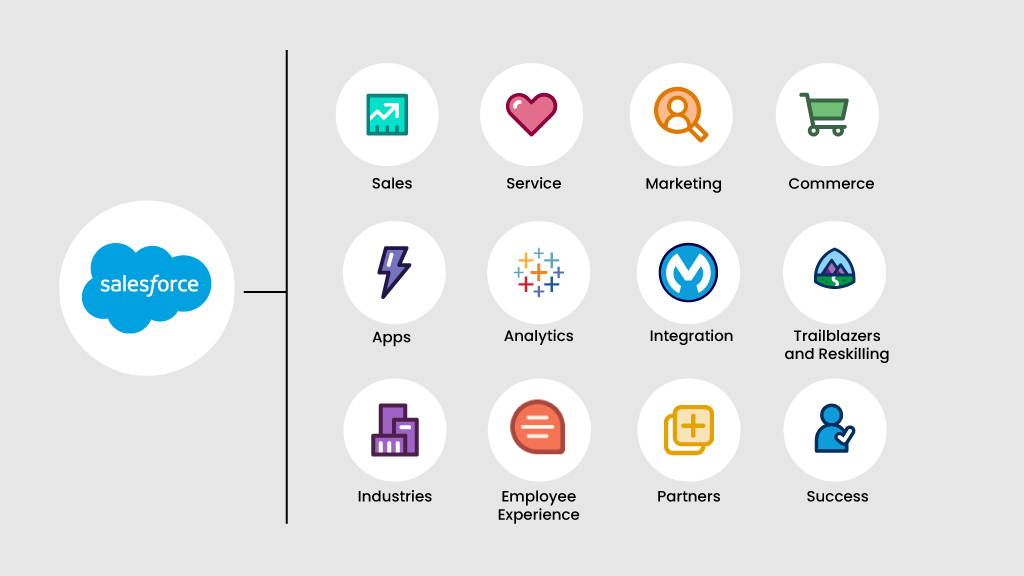
Salesforce, primarily known as a Customer Relationship Management (CRM) platform, has evolved into a powerful Platform-as-a-Service (PaaS). With its Salesforce Platform, developers can build custom apps that integrate seamlessly with Salesforce’s CRM capabilities, offering an efficient and fast way to create apps focused on business workflows and customer relationships.
Key Strengths of Salesforce for App Development:
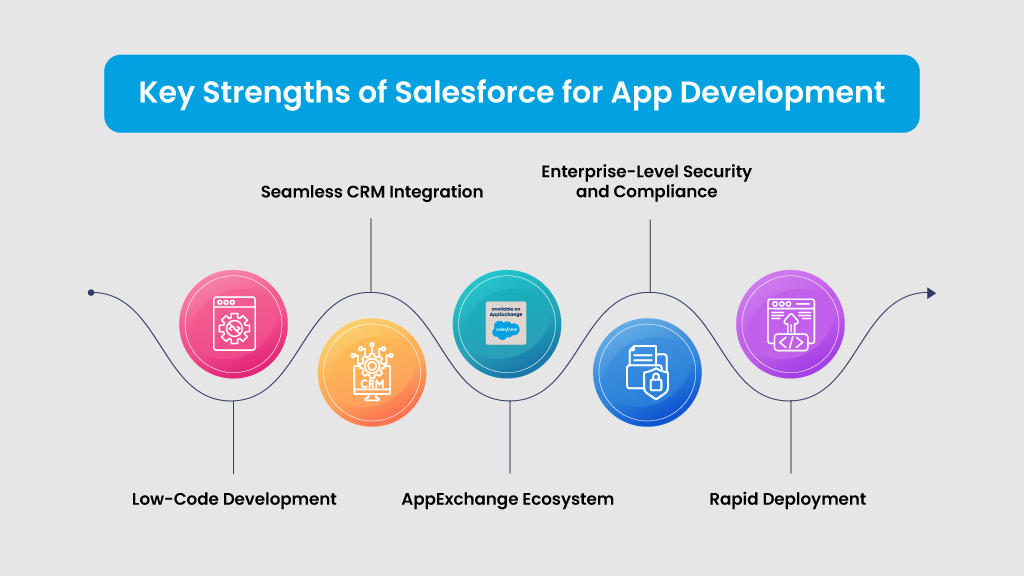
1. Low-Code Development:
Salesforce is designed for both developers and non-developers. With tools like Lightning App Builder and Flow Builder, you can create powerful applications with minimal coding, accelerating development time.
2. Seamless CRM Integration:
If your app needs to integrate with a CRM system or improve customer-centric processes, Salesforce is the clear choice. It’s built to optimize customer service, sales automation, and marketing activities.
3. AppExchange Ecosystem:
Salesforce offers AppExchange, a marketplace for ready-made applications and components. Developers can leverage this ecosystem to accelerate development by using pre-built integrations, components, or apps.
4. Enterprise-Level Security and Compliance:
Salesforce is known for its robust security features and compliance with major industry regulations (like GDPR, HIPAA, etc.). This makes it ideal for apps handling sensitive customer data.
5. Rapid Deployment:
Salesforce’s cloud-based architecture allows for fast deployment and easy scaling of business applications without needing extensive infrastructure management.
Difference between AWS and Salesforce
| Feature | AWS | Salesforce |
|---|---|---|
| Target Users | Developers, IT professionals, and businesses with technical expertise needing scalable infrastructure. | Business users, sales teams, and organizations seeking to streamline processes and improve customer relations. |
| App Development Approach | Infrastructure-as-a-Service (IaaS) and Platform-as-a-Service (PaaS), offering services like EC2, RDS, and Lambda for customized app development. | Platform-as-a-Service (PaaS) with built-in CRM capabilities, using Apex, Visualforce, and Lightning Component Framework to build business apps. |
| Ecosystem and Marketplace | Broad ecosystem with services for computing, storage, machine learning, and more. AWS Marketplace provides third-party integrations. | Strong CRM-focused ecosystem. Salesforce AppExchange offers pre-built apps and components for CRM-related solutions. |
| Pricing | Pay-as-you-go model based on resource usage like compute power, storage, and data transfer. | Subscription-based pricing model, typically per user, per month, depending on the plan selected. |
| Use Cases | Large-scale enterprise apps, SaaS products, and applications requiring heavy computing power, complex workflows, or advanced technologies like AI and IoT. | Enhancing CRM, improving sales processes, and developing business apps quickly within the Salesforce ecosystem. |
Salesforce vs AWS: Choosing the Right Platform- The Key Considerations
| Feature | AWS | Salesforce |
|---|---|---|
| Flexibility and Customization Needs | AWS is ideal if you need complete freedom to build and scale applications from scratch with extensive customization. Choose from various databases, storage, and computing services to meet your exact requirements. | Salesforce is better suited if your app is tied to customer data, business processes, and CRM integration, and you want to quickly build apps without complex infrastructure management. |
| App Type and Purpose | AWS excels in web hosting, mobile app backends, SaaS, and large-scale enterprise applications. It offers services for complex requirements like IoT or machine learning. | Salesforce is perfect for apps that streamline workflows, enhance customer relationships, or improve sales and service automation. It’s best for enterprise applications with a focus on CRM and business processes. |
| Developer Expertise | AWS is suited for teams with developers experienced in various coding languages and frameworks, providing limitless possibilities for fully customized solutions. | Salesforce’s low-code/no-code tools allow non-developers and business users to create apps easily, making it ideal for teams that don’t have extensive coding expertise. |
| Scalability and Global Reach | AWS is designed for massive scalability, offering services like Elastic Load Balancing, CloudFront, and Global Accelerator to ensure high availability and global reach, no matter the traffic volume or location. | Salesforce scales business processes rather than infrastructure. Its multi-tenant architecture ensures that as your business grows, your apps scale automatically to meet your needs. |
Wrap-up: Which Platform Should You Choose?
Choose AWS if:
You need full control over your app’s architecture and customization.
You’re building highly complex, data-intensive applications.
Your app requires advanced technologies like AI, ML, IoT, or analytics.
Scalability and infrastructure flexibility are critical to your project.
Choose Salesforce if:
You want to quickly build and deploy business applications with minimal coding.
Your app is focused on CRM, customer service, or business automation.
You need to leverage Salesforce’s robust ecosystem and integrations with existing Salesforce products.
Security, compliance, and easy management of customer data are top priorities.
Security, compliance, and easy management of customer data are top priorities.
Both platforms are powerful in their own right, but the best choice depends on your specific app requirements, development team expertise, and long-term business goals. So, what is the answer to Salesforce vs AWS?- Always consider the use case, flexibility, and the level of integration required to determine which platform best aligns with your vision.
CEPTES, a Saksoft company, is a Summit Partner and boutique Salesforce Service Provider having partnered with 1000+ customers across the globe and a proven track record of more than 15 years. If you are thinking of growing your business using the Salesforce platform, then get in touch; we are happy to help you.
FAQs
1. What is the main difference between AWS and Salesforce in app development?nd?
2. Which platform offers more flexibility and customization, Salesforce or AWS?
3. Which of these is better for non-technical users?
4. How do AWS and Salesforce compare in terms of security and compliance?
5. How do pricing models differ between AWS and Salesforce?

Nilamani Das
Nilamani is a thought leader who champions the integration of AI, Data, CRM and Trust to craft impactful marketing strategies. He carries 25+ years of expertise in the technology industry with expertise in Go-to-Market Strategy, Marketing, Digital Transformation, Vision Development and Business Innovation.










